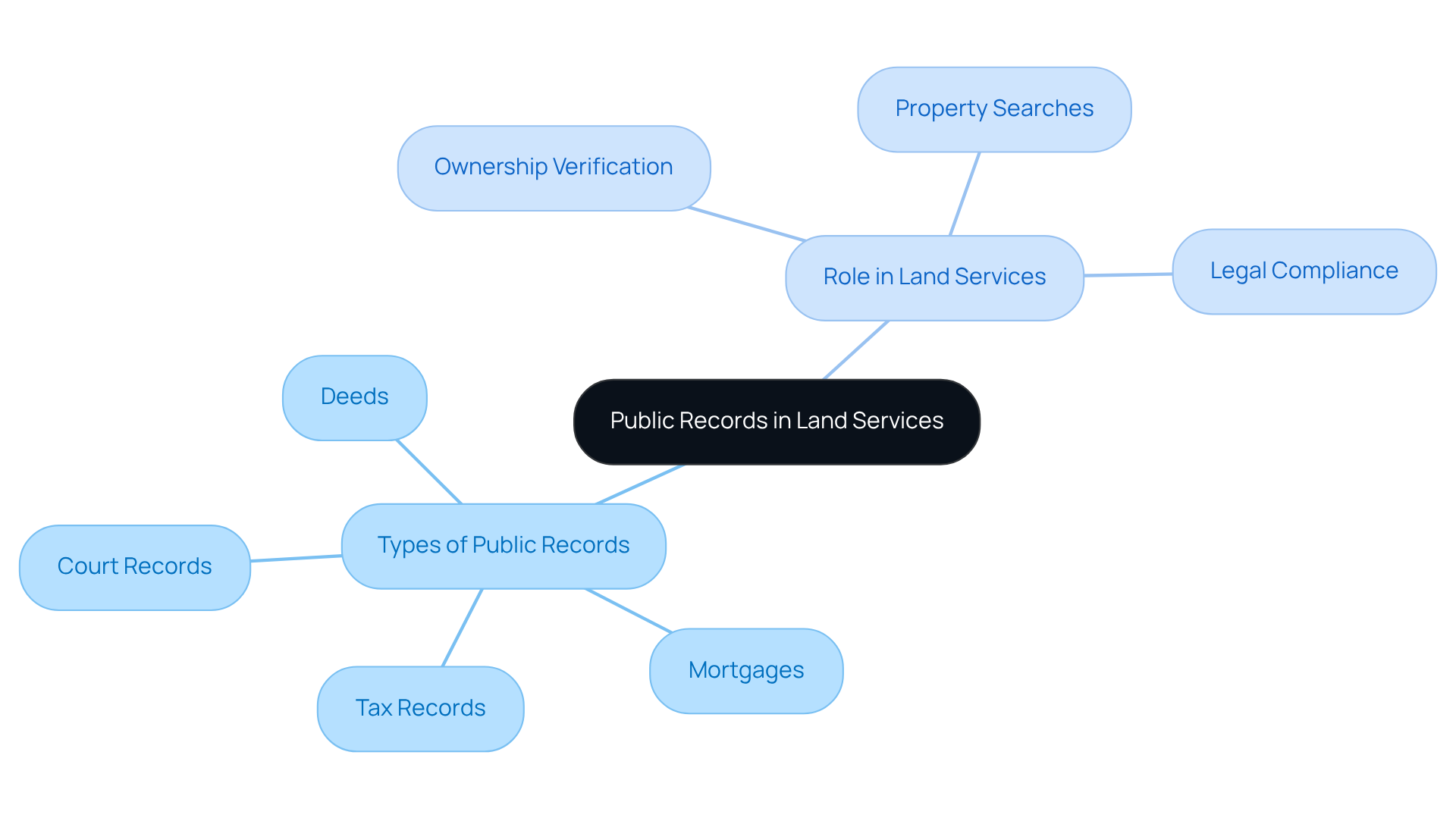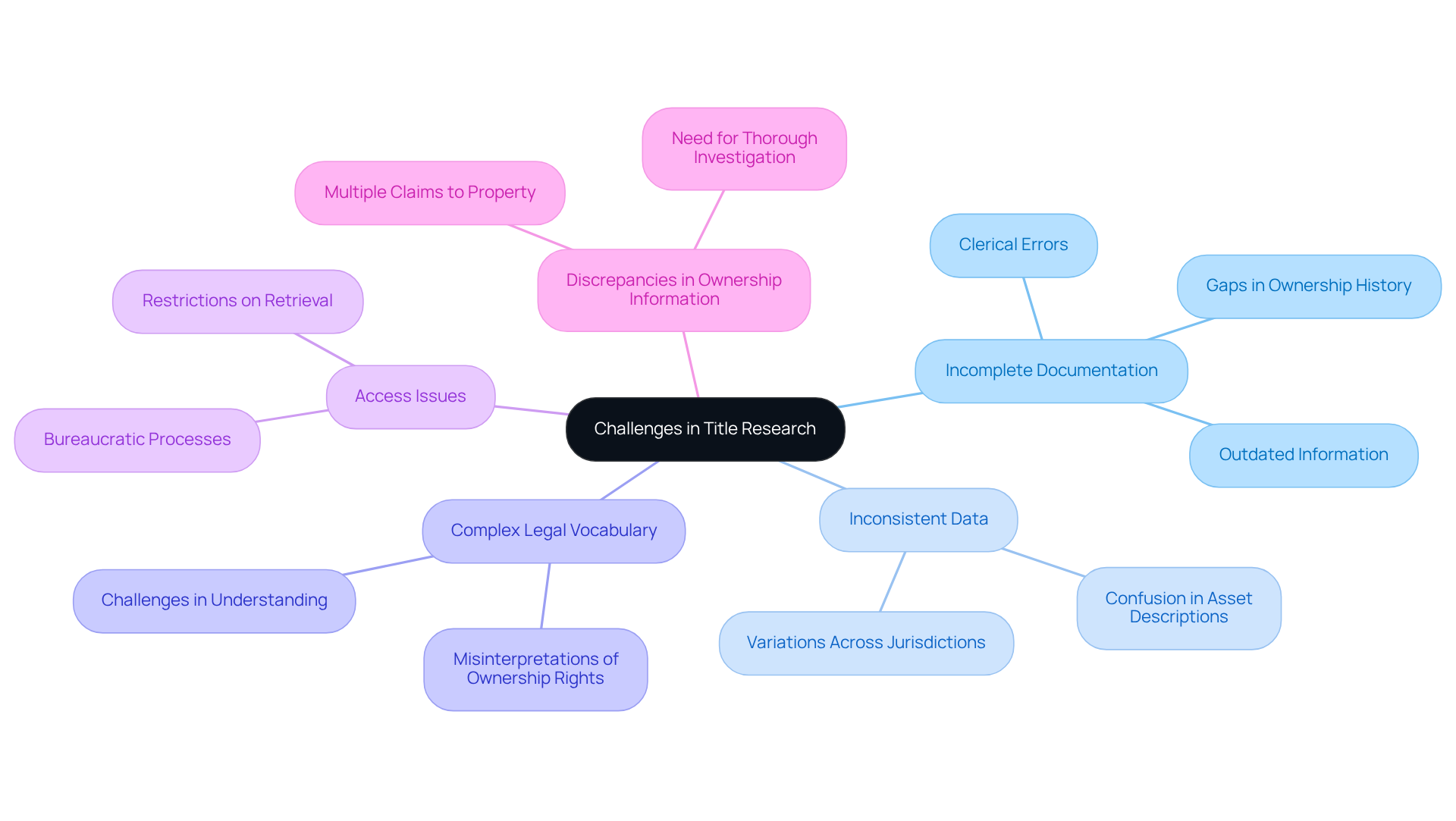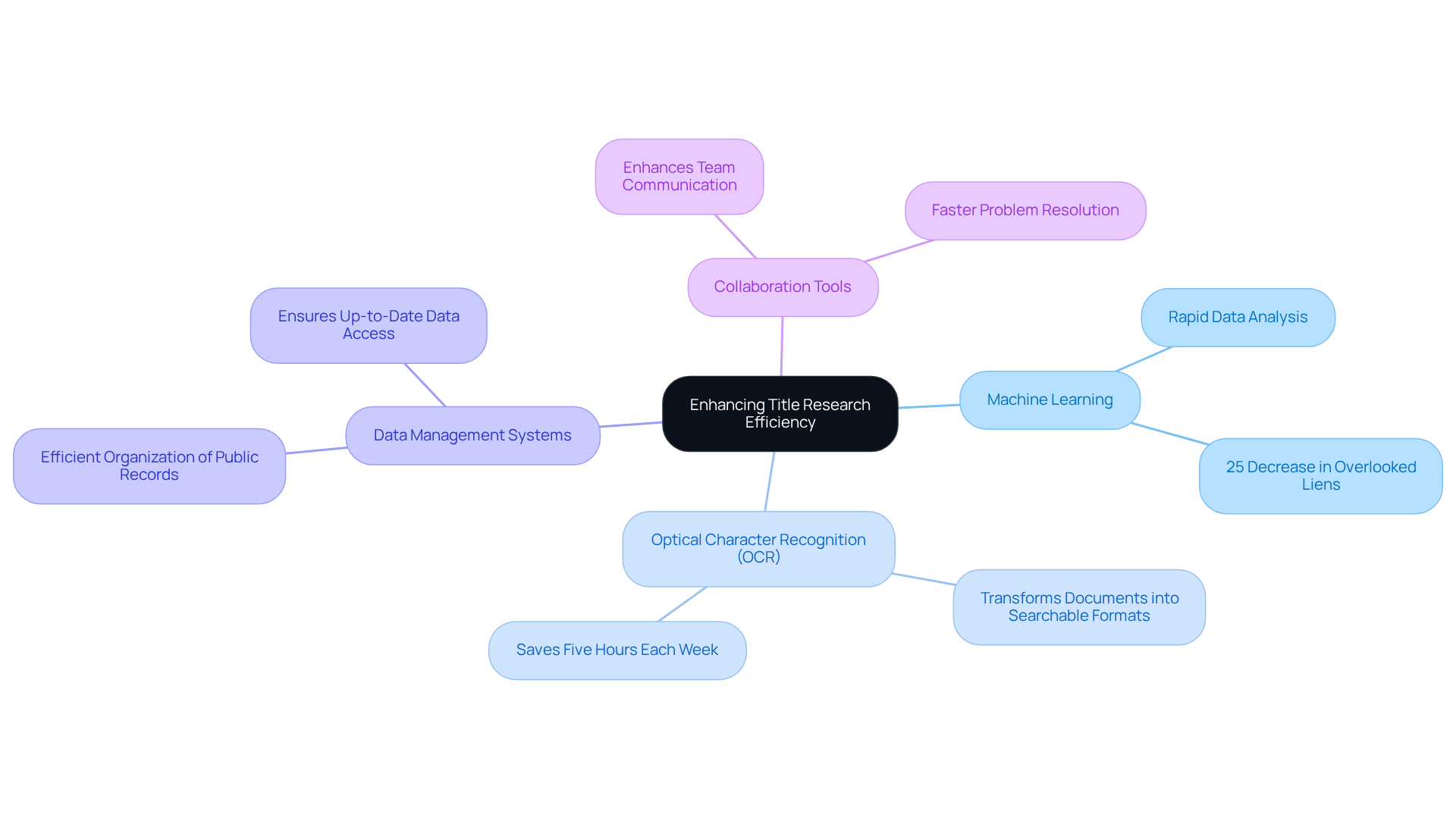Overview
Public records play a crucial role in land services for title research directors, offering essential documentation that verifies ownership, facilitates property searches, and ensures legal compliance in real estate transactions. This article highlights the importance of these records, noting that despite challenges such as incomplete data and access issues, they form a foundation for informed decision-making.
Furthermore, when supported by advanced technologies like machine learning and OCR, public records can significantly enhance service delivery. Consequently, leveraging these tools not only addresses existing challenges but also empowers professionals to make more reliable and efficient decisions.
Introduction
Public records form the backbone of land services, providing a wealth of information essential for verifying property ownership and ensuring the legality of transactions. As title research directors navigate the complexities of real estate, grasping the nuances of these documents is paramount for effective decision-making. However, the landscape presents significant challenges, from incomplete documentation to inconsistent data. This raises a critical question: how can professionals leverage technology to overcome these obstacles, thereby enhancing the accuracy and efficiency of their research?
Define Public Records and Their Role in Land Services
Public files are official documents maintained by government agencies and are accessible to the public. These files encompass various documents, including land deeds, tax assessments, and court documents. In the realm of land services, it is important to understand how public records impact land services for verifying ownership and ensuring the legality of transactions.
-
Types of Public Records: Key categories include:
- Deeds: Legal documents that establish property ownership.
- Mortgages: Records detailing loans secured by real estate.
- Tax Records: Data concerning taxes owed and paid on real estate.
- Court Records: Documents pertaining to legal disputes involving real estate.
-
Role in Land Services: Public records are crucial for:
- Ownership Verification: Confirming the legal owner of a property is vital for preventing disputes.
- Property Searches: Examining a property's history to uncover any claims or liens, thus ensuring clear ownership.
- Legal Compliance: Guaranteeing that all transactions adhere to local laws and regulations, which is essential for maintaining market integrity.
Utilizing these documents allows research supervisors to deliver to clients, highlighting how public records impact land services and facilitating smoother real estate transactions. For example, comprehensive access to county recorder deed data enables professionals to assess ownership history and transaction details, which are crucial for informed decision-making. Furthermore, statistics reveal that incomplete recorder deed data can result in inadequate risk assessments, as demonstrated in the case study "Role of Recorder Deed Data in Risk Assessment," underscoring the necessity for complete data in accurate market analysis. By effectively leveraging governmental documents, property research managers can enhance their service offerings and illustrate how public records impact land services, contributing to a more transparent real estate market. As highlighted by PropertyRadar, open documents serve as a robust foundation for real estate dealings, emphasizing their significance in the sector.

Identify Challenges in Title Research Due to Public Records
While discussing how public records impact land services, it is important to note that they are invaluable for title research but also present several challenges that can complicate the verification process.
- Incomplete Documentation: Official files often lack essential details, resulting in gaps in ownership history. This issue can arise from clerical errors or outdated information.
- Inconsistent Data: The variations in how information is recorded across different jurisdictions can create confusion. For instance, asset descriptions may differ between documents, complicating the verification process.
- The intricate legal vocabulary found in official documents poses challenges in understanding, leading to misconceptions or misinterpretations of ownership rights.
- Access Issues: Retrieving public records can sometimes be cumbersome due to bureaucratic processes or restrictions, which can delay property research efforts.
- Discrepancies in Ownership Information: Conflicts may arise when multiple claims to a property exist, necessitating thorough investigation to resolve ownership disputes. Title companies report that in more than one-third of all real estate transactions, they must undertake '' to address such title issues, as noted by Sandy Gadow. This underscores the significance of thorough searches of official documents in understanding how public records impact land services.
Furthermore, frequent mistakes in official documents, such as inaccurate legal descriptions and misspelled names, complicate transactions and require additional efforts to rectify. Identifying and correcting these errors early in the transaction process is crucial to avoid complications that could delay closing, such as issues with property value or loan approvals.
By understanding these obstacles, research supervisors can implement strategies to mitigate risks, such as utilizing advanced technologies like machine learning and optical character recognition to enhance the extraction and examination of public documents.

Utilize Technology to Enhance Title Research Efficiency
The incorporation of technology into document research processes is fundamentally transforming the understanding of how public records impact land services. Key technologies that significantly enhance efficiency include:
- Machine Learning: This technology rapidly analyzes vast datasets, uncovering patterns and discrepancies that may elude human researchers. By automating data retrieval from public documents, machine learning can greatly shorten search durations, illustrating how public records impact land services. For instance, one firm reported a 25% decrease in overlooked liens through advanced trend analysis, showcasing the tangible benefits of this technology.
- Optical Character Recognition (OCR): OCR technology transforms various document types, including scanned paper documents and PDFs, into editable and searchable formats. This capability allows researchers to quickly access and examine historical documents that may not be available in digital formats, thereby improving overall research efficiency. For instance, professionals utilizing SmartTitle Assistant™ save more than five hours each week on average, thanks to OCR integration—a statistic backed by industry reports.
- Data Management Systems: Implementing robust data management systems facilitates the efficient organization and storage of public records. These systems enable easy access to information, ensuring that researchers have the most up-to-date and precise data available to understand how public records impact land services, which is essential for informed decision-making. Additionally, compliance with state and federal regulations regarding data privacy and cybersecurity is paramount, as highlighted in recent industry discussions.
- Collaboration Tools: Utilizing enhances communication among team members, enabling real-time sharing of insights and findings. This results in faster resolutions of problems that arise during the research process, ultimately enhancing service delivery.
By adopting these technologies, title research directors can streamline workflows, enhance accuracy, and provide superior service to their clients, thereby contributing to a more reliable real estate market.

Conclusion
Public records play a pivotal role in land services, serving as the backbone for title research and property transactions. Their significance extends beyond verifying ownership and ensuring legal compliance; they enhance the integrity of real estate dealings. The effective use of these documents fosters transparency and trust within the market, highlighting their essential function in the property landscape.
This article delves into various types of public records, including:
- deeds
- mortgages
- tax records
- court documents
These records contribute significantly to ownership verification, property searches, and legal compliance. Furthermore, it addresses the challenges faced in title research, such as:
- incomplete documentation
- inconsistent data
- access issues
These challenges complicate the verification process. Moreover, the integration of technology—specifically machine learning and optical character recognition—emerges as a vital solution for overcoming these challenges, streamlining workflows, and enhancing accuracy in title research.
Ultimately, the insights presented underscore the importance of leveraging public records and technology to navigate the complexities of land services effectively. By embracing these tools and strategies, title research directors can improve their efficiency and contribute to a more reliable and transparent real estate market. Engaging with public records thoughtfully and proactively is essential for fostering a secure environment for property transactions and ensuring informed decision-making in the industry.
Frequently Asked Questions
What are public records?
Public records are official documents maintained by government agencies that are accessible to the public. They include various documents such as land deeds, tax assessments, and court documents.
What types of public records are relevant to land services?
Key categories of public records relevant to land services include deeds, mortgages, tax records, and court records.
How do public records impact land services?
Public records impact land services by enabling ownership verification, facilitating property searches, and ensuring legal compliance in transactions.
Why is ownership verification important in land services?
Ownership verification is vital for confirming the legal owner of a property, which helps prevent disputes over ownership.
What is the significance of property searches in land services?
Property searches are important for examining a property's history to uncover any claims or liens, ensuring clear ownership and preventing future legal issues.
How do public records ensure legal compliance in real estate transactions?
Public records help guarantee that all transactions adhere to local laws and regulations, which is essential for maintaining the integrity of the real estate market.
How can access to public records enhance real estate transactions?
Access to public records allows research supervisors to provide precise and reliable information to clients, facilitating smoother real estate transactions and informed decision-making.
What risks are associated with incomplete recorder deed data?
Incomplete recorder deed data can lead to inadequate risk assessments, which may result in poor decision-making and potential legal issues in real estate transactions.
What role do governmental documents play in the transparency of the real estate market?
Governmental documents serve as a robust foundation for real estate dealings, contributing to a more transparent market by providing essential information for transactions.




